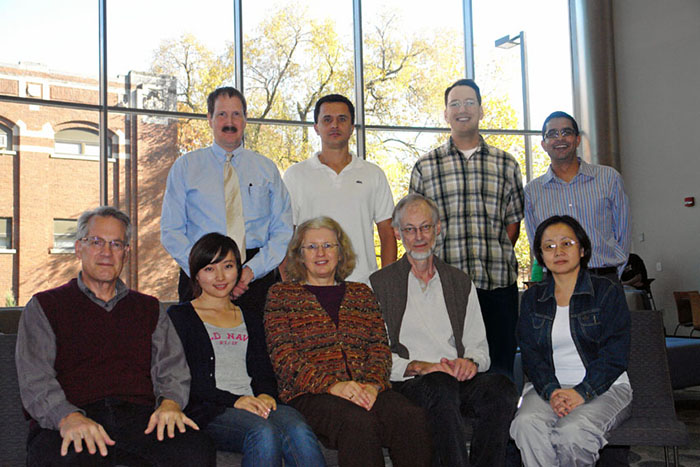Computer Science Teaching Endorsement
11-05-2010

Front Row (Left to Right): Tim Korb, Ninger Zhou , Susanne Hambrusch, Christoph Hoffmann, and Lily Wu.
A joint program between the Purdue Computer Science Department and College of Education has created a new computer science endorsement for Education majors. This endorsement—a Computer Science Teaching Supplemental Licensure Program—will prepare Purdue education majors to teach computer science in secondary schools. The endorsement satisfies the educational computing standards set by the National Council for Accreditation of Teacher Education (NCATE) and the International Society for Technology in Education (ISTE). It incorporates recommendations made in the ACM Model Curriculum for K-12 Computer Science as well as by the Computer Science Teachers Association (CSTA).
“This project represents a first in terms of collaboration between Education and Computer Science in the area of teacher licensing at Purdue,” says James Lehman, Associate Dean in the College of Education and a member of the project team. “We are excited about the opportunity this provides for secondary teaching majors to add an additional area of certification, which helps to make them more marketable as prospective teachers. At the same time, the program is helping to strengthen the teaching of computer science in high schools, which should ultimately help students to be better educated for the twenty-first century.”
The endorsement consists of two components, one in education and the other in computer science. Students take courses in Computer Science to build content knowledge of the discipline. They take courses in the College of Education to learn pedagogical principles.
Faculty in Computer Science and Education have developed two new courses for the endorsement. The first is a one-credit course titled “Contemporary Issues in Computing” (currently offered as CS 19000), which explores how computing affects everyone in society, how the Internet has changed the way societies and individuals function, and what the implications are for the future. The second is a three-credit course on “Methods of Teaching Computer Science” (currently offered jointly as CS 49000 / EDPS 49100). The methods course covers topics that explore effective techniques for teaching computational thinking, and presents the latest education research on how to teach computing concepts and programming skills. Both courses are co-taught by faculty in Computer Science and Education.
In addition to the two new courses, students seeking the endorsement take four computer science courses in programming, discrete mathematics, and data structures and algorithms (more details about the curriculum are available at cs4edu.cs.purdue.edu/license). The endorsement allows courses taken in Computer Science, Mathematics, and Electrical and Computer Engineering to be counted towards the requirements, reflecting the broad student population the endorsement is reaching.
Establishing a Computer Science Teaching Endorsement is one of the goals of the NSF-funded “Computer Science for Education” (CS4EDU) project, whose overarching mission is to create new pathways for undergraduate education majors to become computationally-educated secondary teachers. The CS4EDU project was started by Susanne Hambrusch, who is now on leave at NSF. She noted that the new Teaching Endorsement is a “vital component towards creating a computationally-educated workforce for the 21st century.” Computer Science education in the high schools is starting to undergo a major revision and reevaluation, adding “there is a need to increase the number of teachers who are educated in computational thinking and are prepared to teach programming.”
Christoph Hoffmann, the current leader of the CS4EDU project team, said that creating strong programs in computing and computational thinking at the high school level will build “an important basis for future generations to successfully compete in the global economy.” He added that “in a flat world, the well-being of the nation will depend on computer savvy and scientific literacy. We are excited to be at the forefront of this initiative.”
In a national effort to increase the teaching of Computer Science in schools, the National Science Foundation has started an initiative to expand the number of high school educators who are qualified to teach computer science from 2,000 to 10,000 by 2015. It also aims to reverse the declining college enrollment in computer science by improving the quality and availability of an advanced computer science curriculum at the high school level.
According to the national Computer Science Teachers Association (CSTA), this project addresses a profound and widespread gap in teacher certification. “If we are going to address national competitiveness issues, we to need repair the disconnect between courses that are critical to student success and teacher preparation and certification. This project ensures that new teachers will be both properly prepared and credentialed to teach computer science”, said Chris Stephenson, executive director of CSTA.
Project participants include Christoph Hoffmann, Susanne Hambrusch, Tim Korb, and Voicu Popescu from Computer Science, and James Lehman and Aman Yadav from the College of Education. The CS4EDU project is funded in part by the National Science Foundation and a gift from State Farm.